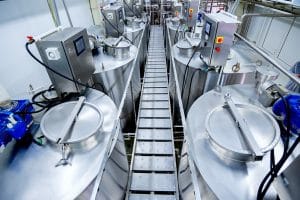 Food and beverage companies have faced many challenges over the years, especially as technology has transformed it and every other industry. One of those challenges has been how to most effectively and efficiently the increasingly more demanding thermal management needs of food and beverage production. In addition to cooling electrical enclosures, as companies in every other industry must account for, food and beverage companies also face several unique thermal management needs. In many cases, heat exchangers have provided these companies with the optimal solution for addressing them, as well as the more common electrical thermal management needs they share with other industries.
Food and beverage companies have faced many challenges over the years, especially as technology has transformed it and every other industry. One of those challenges has been how to most effectively and efficiently the increasingly more demanding thermal management needs of food and beverage production. In addition to cooling electrical enclosures, as companies in every other industry must account for, food and beverage companies also face several unique thermal management needs. In many cases, heat exchangers have provided these companies with the optimal solution for addressing them, as well as the more common electrical thermal management needs they share with other industries.
Thermal management concerns for modern production
Cooling electrical control panels and other enclosures is still an essential concern in food and beverage manufacturing. As with companies in all other industries, they’ve relied increasingly more on advanced technologies that require effective, efficient electrical cooling solutions. However, the processes involved with producing, packaging, and shipping perishable foods and beverages also require more specialized thermal management. Such products can spoil and become harmful if consumed, unless proper thermal management techniques were employed during each phase of the production process. With heat exchangers, companies have been able to ensure a safer and more reliable way to achieve all of their thermal management needs, especially those that directly impact the production process.
How heat exchangers have exceeded expectations
In typical applications, the goal of modern heat exchangers is to make electrical cooling more efficient and more manageable. They achieve this by providing a way to absorb the waste heat as soon as electrical components generate it, and then transfer and dissipate the heat somewhere safely away from the sensitive components. When used to keep electrical enclosures cooled, heat exchangers can operate continuously, creating a cycle of heat transfer where electrical waste heat is safely released in a heat depository (such as a heat sink). In more specialized applications, the same process can be used to help maintain specific temperatures for long periods of time, all while minimizing the effort and cost traditionally associated with these processes.
The state of modern food and beverage production
With the ability to help maintain specific temperatures for processes like pasteurization, packaging, and shipping, food and beverage companies have benefited greatly from the advent of heat exchangers. The simplified methods used to transfer heat make the modern thermal management solutions highly customizable to fit most unique applications’ needs. They’re also a more cost-efficient and eco-friendly way for companies in the food and beverage industry to streamline many of their essential operations beyond electrical cooling.
For more information about improved thermal management for food and beverage production, call Noren Thermal Solutions in Taylor, TX, today at 866-936-6736.







